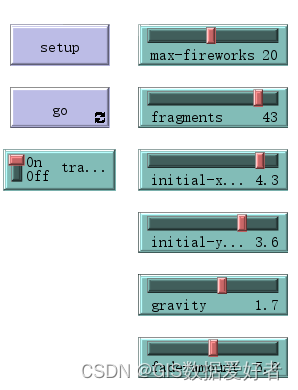烟花模型与代码
它是什么?
这个程序模拟了烟花的表演。火箭从视野底部开始,向天空射出,然后爆炸,释放出瀑布般的火花。

它是如何工作的?
每个火箭都由一只乌龟来代表,以初始的x和y速度向上发射。在天空的某一点,会发生爆炸,这由一系列乌龟的孵化来表示。每个孵化的乌龟都会继承原始火箭的速度,还会获得来自爆炸本身的速度。结果就是一个烟花表演的模拟。

如何使用它
SETUP根据所有滑块和开关指示的值设置模型。GO是一个一直执行模型的按钮。
FIREWORKS会创建0到滑块上指示的数字之间的随机数量的烟花。
FRAGMENTS确定在单个烟花爆炸后会有多少粒子碎片。
GRAVITY确定环境中的重力强度。较大的值会提供更大的重力加速度,意味着粒子会以更快的速度被迫落到地面上。较小的值则相反。
INIT-X-VEL将每个火箭的初始x速度设置为滑块指示的负值和正值之间的随机数。
INIT-Y-VEL将每个火箭的初始y速度设置为0到滑块指示的数字加十之间的随机数。这是为了确保烟花的初始y速度有不同范围。
FADE-AMOUNT确定爆炸后粒子消失的速度。
TRAILS允许用户打开或关闭粒子留下的尾迹。换句话说,如果TRAILS开关打开,那么乌龟会留下尾迹。如果关闭,它们就不会留下尾迹。
这个模型被构建成滑块和开关的所有变都会在执行过程中生效。因此,当GO按钮还按下时,你可以改变滑块和开关的值,你可以立即在视图中看到这些改变。

注意事项
尝试使用INIT-X-VEL和INIT-Y-VEL滑块。观察到当初始x速度为零时,火箭会直直地向上发射。当初始x速度增加时,注意到一些火箭在天空中左右弧线轨迹取决于初始x速度是负数还是正数。
观察到在固定的GRAVITY值下,初始y速度较小时,烟花的高度较低,而初始y速度较大时,高度较高。还要观察到每个火箭在高度等于或略低于其顶点处爆炸。
尝试的事情
观察当GRAVITY滑块设置为不同值时模型会发生什么。当GRAVITY设置为零时观察模型会发生什么。你能解释模型中烟花发生了什么吗?你能解释为什么会发生这种现象吗?这对重力的重要性有什么说法?现在将GRAVITY滑块设置为最大值。在这种情况下,烟花的行为有什么不同?你能得出关于重力和物体在空间中移动的关系的结论吗?
扩展模型
这个模型中表示的烟花只是一种基本类型。扩展这个模型的一个好方法是创建其他更复杂的烟花。一些可能有多次爆炸、多种颜色或特定形状的设计。
注意到这个模型是以二维视角描绘的烟花。然而,当我们看到真正的烟花时,它们似乎呈现出三维形式。尝试通过将其视角从2D转换为3D来扩展这个模型。
代码
breed [ rockets rocket ]
breed [ frags frag ]
globals [
countdown ; how many ticks to wait before a new salvo of fireworks
]
turtles-own [
col ; sets color of an explosion particle
x-vel ; x-velocity
y-vel ; y-velocity
]
rockets-own [
terminal-y-vel ; velocity at which rocket will explode
]
frags-own [
dim ; used for fading particles
]
to setup
clear-all
set-default-shape turtles "circle"
reset-ticks
end
; This procedure executes the model. If there are no turtles,
; it will either initiate a new salvo of fireworks by calling
; INIT-ROCKETS or continue to count down if it hasn't reached 0.
; It then calls PROJECTILE-MOTION, which launches and explodes
; any currently existing fireworks.
to go
if not any? turtles [
ifelse countdown = 0 [
init-rockets
; use a higher countdown to get a longer pause when trails are drawn
set countdown ifelse-value trails? [ 30 ] [ 10 ]
] [
; count down before launching a new salvo
set countdown countdown - 1
]
]
ask turtles [ projectile-motion ]
tick
end
; This procedure creates a random number of rockets according to the
; slider FIREWORKS and sets all the initial values for each firework.
to init-rockets
clear-drawing
create-rockets (random max-fireworks) + 1 [
setxy random-xcor min-pycor
set x-vel ((random-float (2 * initial-x-vel)) - (initial-x-vel))
set y-vel ((random-float initial-y-vel) + initial-y-vel * 2)
set col one-of base-colors
set color (col + 2)
set size 2
set terminal-y-vel (random-float 4.0) ; at what speed does the rocket explode?
]
end
; This function simulates the actual free-fall motion of the turtles.
; If a turtle is a rocket it checks if it has slowed down enough to explode.
to projectile-motion ; turtle procedure
set y-vel (y-vel - (gravity / 5))
set heading (atan x-vel y-vel)
let move-amount (sqrt ((x-vel ^ 2) + (y-vel ^ 2)))
if not can-move? move-amount [ die ]
fd (sqrt ((x-vel ^ 2) + (y-vel ^ 2)))
ifelse (breed = rockets) [
if (y-vel < terminal-y-vel) [
explode
die
]
] [
fade
]
end
; This is where the explosion is created.
; EXPLODE calls hatch a number of times indicated by the slider FRAGMENTS.
to explode ; turtle procedure
hatch-frags fragments [
set dim 0
rt random 360
set size 1
set x-vel (x-vel * .5 + dx + (random-float 2.0) - 1)
set y-vel (y-vel * .3 + dy + (random-float 2.0) - 1)
ifelse trails?
[ pen-down ]
[ pen-up ]
]
end
; This function changes the color of a frag.
; Each frag fades its color by an amount proportional to FADE-AMOUNT.
to fade ; frag procedure
set dim dim - (fade-amount / 10)
set color scale-color col dim -5 .5
if (color < (col - 3.5)) [ die ]
end
; Copyright 1998 Uri Wilensky.
; See Info tab for full copyright and license.本文来自互联网用户投稿,该文观点仅代表作者本人,不代表本站立场。本站仅提供信息存储空间服务,不拥有所有权,不承担相关法律责任。 如若内容造成侵权/违法违规/事实不符,请联系我的编程经验分享网邮箱:chenni525@qq.com进行投诉反馈,一经查实,立即删除!
- Python教程
- 深入理解 MySQL 中的 HAVING 关键字和聚合函数
- Qt之QChar编码(1)
- MyBatis入门基础篇
- 用Python脚本实现FFmpeg批量转换
- C++ 引用
- Spring Task 任务调度工具
- 英语四六级作文常用高级表达汇总(持续更新)
- YOLOv5改进 | 注意力篇 | CGAttention实现级联群体注意力机制 (全网首发改进)
- 渣土车识别摄像机
- bashrc每次都不自动导入
- GC6106 双通道5V低电压步进电机驱动芯片——低噪声、低振动
- Excel模板填充:从minio上获取模板使用easyExcel填充
- 第21集《佛法修学概要》
- 自定义类型:结构体,枚举,联合(2)